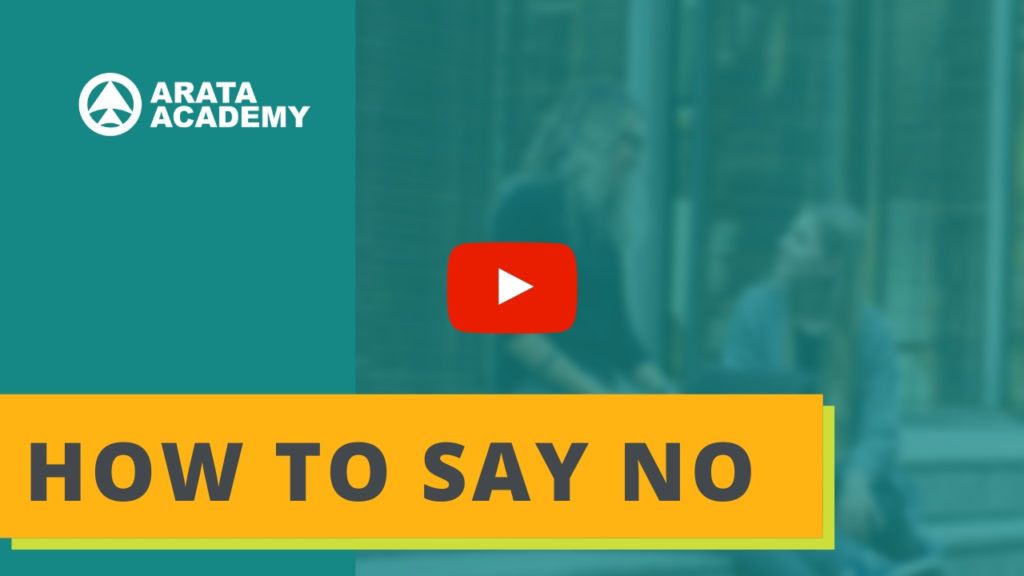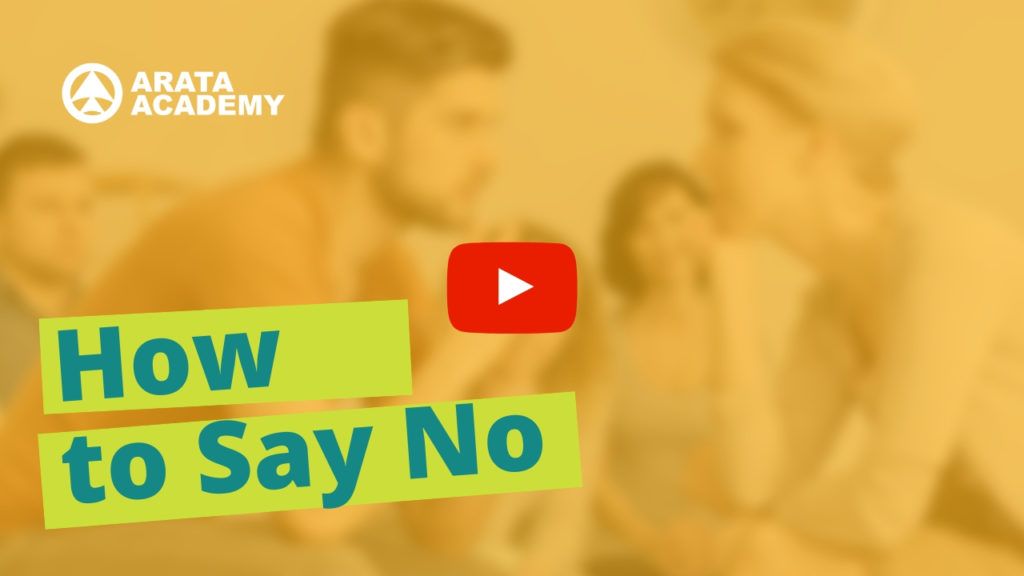Hello! Seiiti Arata. And I did not know how to say no.
I had to study and learn a lot about psychology and dynamic behaviour to be able to change my mind and say no assertively.
If you are also the type of person who finds it difficult to say no, assertiveness will help you to say no firmly and gently.
1. Assertiveness
What is assertiveness? Assertive people can evaluate and express what they think, what they prefer, what they feel.
Assertive communication is clear, is honest, is firm. It is important that you remember the previous episode [http://arata.se/hello63], which said, “Do not confuse saying NO with being impolite”—these are completely unrelated things.
Assertive communication is not aggressive. If I want to be assertive, I will maintain respect, I will not offend, I will not be aggressive, and I will likewise not be submissive, will not be passive.
Passive communication happens when I do not want something, I do not like something, but I say it’s okay. That is a lie! That passivity is a mask to avoid saying what I really think, and that’s not honest communication.
Assertiveness gives me tranquillity. I assess the requests I receive and then make informed choices about whether I will accept or reject them. Assertiveness also allows me to express my opinions and positions, saying what I like, what I do not like, what I prefer—always communicating respectfully.
Finally, assertiveness helps to clarify each individual’s limits without infringing on the boundaries of others. Assertiveness helps to ensure that my own limits are not violated.
2. Stop being nice!
You may have heard a lot of complaints from someone who wears the mask of a very nice person, but when they do not get what they want, they say something like “Nice guys finish last.”
This kind of “niceness” can also be understood as a passive, submissive behaviour. The person’s real needs and preferences are not revealed or communicated.
Passive behaviour places a higher priority on the desires of others. It shows a lack of respect for one’s own needs. It may seem like altruistic behaviour, but the problem occurs when it is not genuine.
You may see exaggerated niceness, for example, when the nice person apologizes, when in fact they think that actually it is the other person who should apologize.
Or when they swallow quietly those situations they do not like.
Or when they are unable to ask for or accept help.
This is the role of the martyr, the superhero, the repressed person.
The problem with staying in this nice position is that we are keeping frustration bottled up within us. At a certain point, it builds up so much that there is an explosion, and suddenly the unexpected happens through violent behaviour. See this dynamic explained in more detail in our video on relationships without drama: http://arata.se/withoutdrama.
3. Lack of assertiveness may induce avoidance.
Before I learned to develop my assertiveness, the best solution I had was simply avoiding interactions if I knew people would ask me for something. Since I did not know how to say no, I coped by staying out of touch with people.
But obviously it is impossible to live in isolation, and this strategy was ineffective. When I met friends and family, and they asked me if I liked something, I just gave a fake smile and said that I liked everything, whether or not it was so. If anyone asked me if I wanted to participate in some activity, but I had no time or had no interest, I would say, “Of course! Just let me know more, and I’ll be there! “
A lot of frustration and restlessness accumulated within me, and this is why I started doing more research about the psychological aspects of the art of saying no. It is not hard! Today, I regret that more people have not learned all these techniques and principles of saying no assertively.
4. Saying yes to everything is a sign of insincerity and immaturity.
I’ll tell you this from experience: Saying yes to everyone all the time is impossibly tiring. This is not good for our mental, physical or emotional health.
Not knowing how to say NO is a stage of emotional immaturity. It is inability to have good communication. It is insincerity.
The maturity will develop when you realize that you do not owe anything to anyone. You are not required to do anything for anyone. You are free to choose what you want as long as you accept the consequences of your choices.
An important message that helps a lot is to understand that you are okay—there is nothing wrong with you! Because of this, you do not have to change your opinion to please others. You do not need to do things you do not want to do just to please other people.
Above all, do not try to buy the love of others by being nice. Do not seek to be accepted by being passive. This was a mistake that I made for many years: somehow I believed that by being nice, people would be nice to me. By sacrificing myself for others, I felt I could be loved.
This path is not sincere.
Today I do not feel I need to please everyone, and this is very liberating. It is a new stage of maturity in my life, and I want the same freedom for you, too. I want you to express yourself clearly, assertively, sincerely, firmly and with respect.
That’s why I created the new course, How to Say No. It is the newest course of Arata Academy, and it is a fast course that you will complete in a single afternoon. It has several exercises to change the way you communicate. You can register here: http://arata.se/howtosayno.
Extra tip: You cannot control people’s opinions of you. This is why you should stop being excessively nice. Stop wearing this “nice” mask with the expectation of being treated in a specific way. This mask will repress your own behaviour, and you will likely end up frustrated.
I’ll tell you something I learned from a very wise person. Take a note of this, because there is a life lesson to be learned.
She told me the following:
No matter what you do, people will always judge you. Fairly or unfairly. This is part of life. Do not try to control what you cannot control. You cannot control the opinions of others. The opinions of others should not ruin your day. You should not change your true opinions because of the others.
If you think that you can have a better life with more assertiveness, visit the link http://arata.se/howtosayno now.

